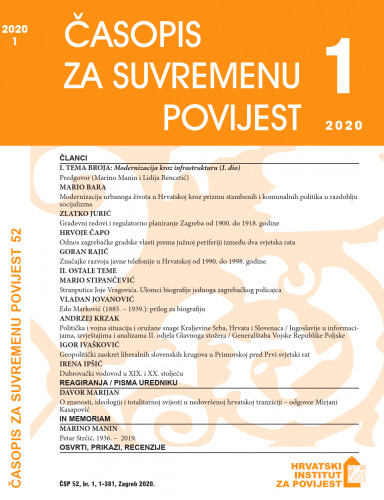Autor analizira pisanje primorskih slovenskih liberalnih novina u vrijeme balkanskih ratova 1912. i 1913., prikazuje geopolitičke stavove toga političkoga kruga te ga smješta u širi kontekst sukoba različitih vizija jugoslavenstva. Specifičan položaj primorskih Slovenaca i geopolitičko značenje Trsta odrazili su se na naklonjenost toga dijela Slovenaca što širemu južnoslavenskom konceptu, koji je trebao biti poluga za slovensku političku emancipaciju. Isprva se taj dio Slovenaca zauzima za ujedinjenje južnoslavenskih naroda unutar Habsburške Monarhije, no analizirano razdoblje donosi preokret koji se očituje u ispuštanju habsburškoga okvira u prvom krugu balkanskih ratova. Drugi je pak krug prouzročio isključivanje Bugarske iz južnoslavenskih koncepata, čime se dio primorskih Slovenaca priklanja užoj viziji južnoslavenske državne ideje sa Srbijom u središnjoj ulozi.; The author analyses the writings of Slovene journals from the Primorska (Slovene Littoral) region in the period of the Balkan Wars, in the years 1912 and 1913. The article presents the shift of liberal Slovenes’ attitudes towards the Yugoslav idea and places it in the broader context of the conflict between various geopolitical ideas. The specific position of the Primorska region and Istria as well as the consequential geopolitical importance of Trieste were reflected in the inclination of those liberal Slovenians to the broader concept of the Yugoslav political idea, which included all South Slavic nations and was supposed to be the leverage for Slovenian political emancipation. Initially, the Slovene liberals, who were gathered in the political group named Edinost (Unity) in Trieste and around the journal Soča in Gorizia, favoured the idea of a third political unit within the Habsburg Monarchy, with the ambition of including Trieste and Gorizia into that entity. However, due to fears of being left outside of that third unit, these Slovenes abandoned so called ‘trialist’ idea. The defeats of the Ottoman Empire in the first round of the Balkan Wars resulted in omitting the Habsburg context in Slovene journals from the Primorska region, while the second round caused the exclusion of Bulgaria from the South Slavic state concepts, and pushed those Slovenes towards the narrower version of the Yugoslav idea, where Serbia was to have a central role.
Sažetak

 Časopis za suvremenu povijest : 52,1(2020) / glavni i odgovorni urednik, editor-in-chief Zdravka Jelaska Marijan.
Časopis za suvremenu povijest : 52,1(2020) / glavni i odgovorni urednik, editor-in-chief Zdravka Jelaska Marijan.